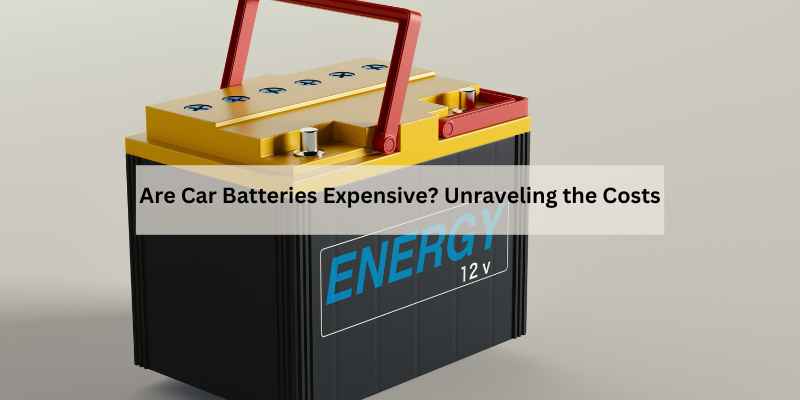Are Car Batteries Expensive? Unraveling the Costs
Car batteries can be expensive, typically ranging from $50 to $200. Prices vary based on brand, type, and vehicle requirements.
A reliable car battery is crucial for vehicle performance and longevity. Many drivers underestimate the cost of replacement, which can impact their budgets. Factors such as battery type, brand reputation, and warranty length influence prices. Standard lead-acid batteries tend to be more affordable, while advanced options like AGM or lithium-ion batteries come at a premium.
Understanding your vehicle’s specific needs helps in making an informed choice. Regular maintenance can also extend battery life, saving you money in the long run. Knowing the costs involved ensures you are prepared for unexpected replacements and can make smarter decisions regarding your vehicle’s upkeep.
The Rise In Car Battery Prices
The cost of car batteries has seen a significant increase recently. Several factors contribute to this rise in prices.
Raw material costs have surged. Lithium, cobalt, and nickel are crucial for modern batteries. Supply chain issues have also played a role. Many manufacturers face delays and shortages.
Demand for electric vehicles is soaring. More people want eco-friendly options. This has led to higher prices for batteries.
Comparative costs show how prices have changed. Here’s a simple overview:
| Year | Average Battery Cost |
|---|---|
| 2010 | $100 |
| 2015 | $150 |
| 2020 | $200 |
| 2023 | $300 |
Types Of Car Batteries
Traditional Lead-Acid Batteries are the most common type of car battery. They are affordable and widely available. These batteries use a chemical reaction between lead and acid to produce energy. They usually last around three to five years. Regular maintenance can help extend their life.
Advanced Lithium-Ion Options are becoming more popular. They are lighter and more efficient than lead-acid batteries. Lithium-ion batteries charge faster and last longer, often exceeding five years. Their higher cost reflects the advanced technology used in them. Many electric vehicles now rely on these batteries.
Material Costs And Availability
The cost of car batteries often depends on raw materials. Prices for materials like lead and lithium can change suddenly. This affects battery prices directly.
Supply chain issues can worsen the situation. Delays in getting materials can lead to higher costs. Global events, like natural disasters or political issues, can disrupt supply. These factors create a volatile market for car batteries.
| Material | Typical Price Range |
|---|---|
| Lead | $0.80 – $1.20 per pound |
| Lithium | $10,000 – $15,000 per ton |
Technological Advancements
Recent innovations in battery technology have changed the car battery market. New materials and designs make batteries more efficient and durable. These advancements can lead to long-term savings for car owners.
Some new features include:
- Fast Charging: Quicker recharge times save time and energy.
- Longer Lifespan: New batteries last longer, reducing replacement costs.
- Environmentally Friendly: Modern batteries use recyclable materials.
Investing in advanced batteries can save money over time. Many drivers find that these features help them spend less on maintenance. Overall, upgrading to newer battery technology makes good financial sense.
Manufacturer And Brand Variations
Car batteries come in many brands and manufacturers. The price can vary widely. Premium brands often cost more but offer better performance. They may last longer and provide more power. Budget options are cheaper but might not be as reliable.
Warranty is an important factor. Premium batteries usually have a longer warranty. This can save money in the long run. Quality also matters. A high-quality battery can prevent frequent replacements.
| Type | Price Range | Warranty |
|---|---|---|
| Premium Brands | $100 – $300 | 3 – 5 years |
| Budget Options | $50 – $100 | 1 – 2 years |
Electric Vehicles And Battery Expense
Electric vehicles (EVs) have different battery costs than traditional cars. EV batteries are usually more expensive upfront. They can range from $5,000 to $15,000 based on size and type. Internal combustion engines (ICE) have cheaper parts but higher fuel costs over time.
Battery prices are slowly decreasing. The cost of lithium-ion batteries has dropped about 89% since 2010. This trend may continue as technology improves. Many experts predict further reductions in battery prices in the coming years.
| Type of Vehicle | Average Battery Cost |
|---|---|
| Electric Vehicles | $5,000 – $15,000 |
| Internal Combustion Engines | $2,000 – $4,000 |
Maintenance And Longevity
To extend battery life, regular maintenance is important. Keep the battery clean and dry. Check terminals for corrosion and clean them as needed. Ensure the battery is securely mounted to prevent damage.
Use a trickle charger if the car sits for long periods. This keeps the battery charged without overloading it. Driving regularly also helps maintain charge levels and overall health.
The true cost of ownership includes more than just the battery price. Consider maintenance costs and potential replacements. Investing in a quality battery may save money in the long run.
Market Trends And Consumer Choices
Consumer demand for car batteries has changed recently. Many people want long-lasting and reliable batteries. This shift affects prices significantly. Economical options are now more popular among buyers.
Market trends show that technology is improving battery performance. Newer models often come with better warranties. As a result, prices can vary widely. Premium brands may cost more but offer great quality.
Understanding these trends helps consumers make informed choices. Always check reviews and ratings before buying. Comparing different brands can lead to better deals.
Frequently Asked Questions
Are Car Batteries Really Expensive?
Car batteries can be costly, but prices vary. Standard batteries typically range from $50 to $200. Premium or specialized batteries may cost more. Factors like brand, type, and vehicle model influence pricing. Always compare options to find the best value for your needs.
What Affects Car Battery Prices?
Several factors influence car battery prices. These include battery type, brand reputation, and vehicle specifications. Additionally, warranties and features like longevity can raise costs. Local market conditions and installation fees may also play a role. Researching these factors can help you make an informed decision.
How Often Should I Replace My Car Battery?
Most car batteries last between three to five years. However, this can depend on usage, climate, and maintenance. Regular checks can extend battery life. If you notice starting issues or dimming lights, it may be time for a replacement. Always consult a professional for advice.
Can I Save Money On Car Batteries?
Yes, you can save on car batteries. Look for sales, discounts, or promotions at auto parts stores. Consider buying a battery online for better deals. Additionally, recycling your old battery may earn you a credit. Always research and compare prices before making a purchase.
Conclusion
Car battery prices can vary significantly based on factors like brand and type. Understanding these costs helps you make informed choices. Regular maintenance and timely replacements can save you money in the long run. Ultimately, investing in a quality battery ensures reliability and peace of mind for your vehicle.







